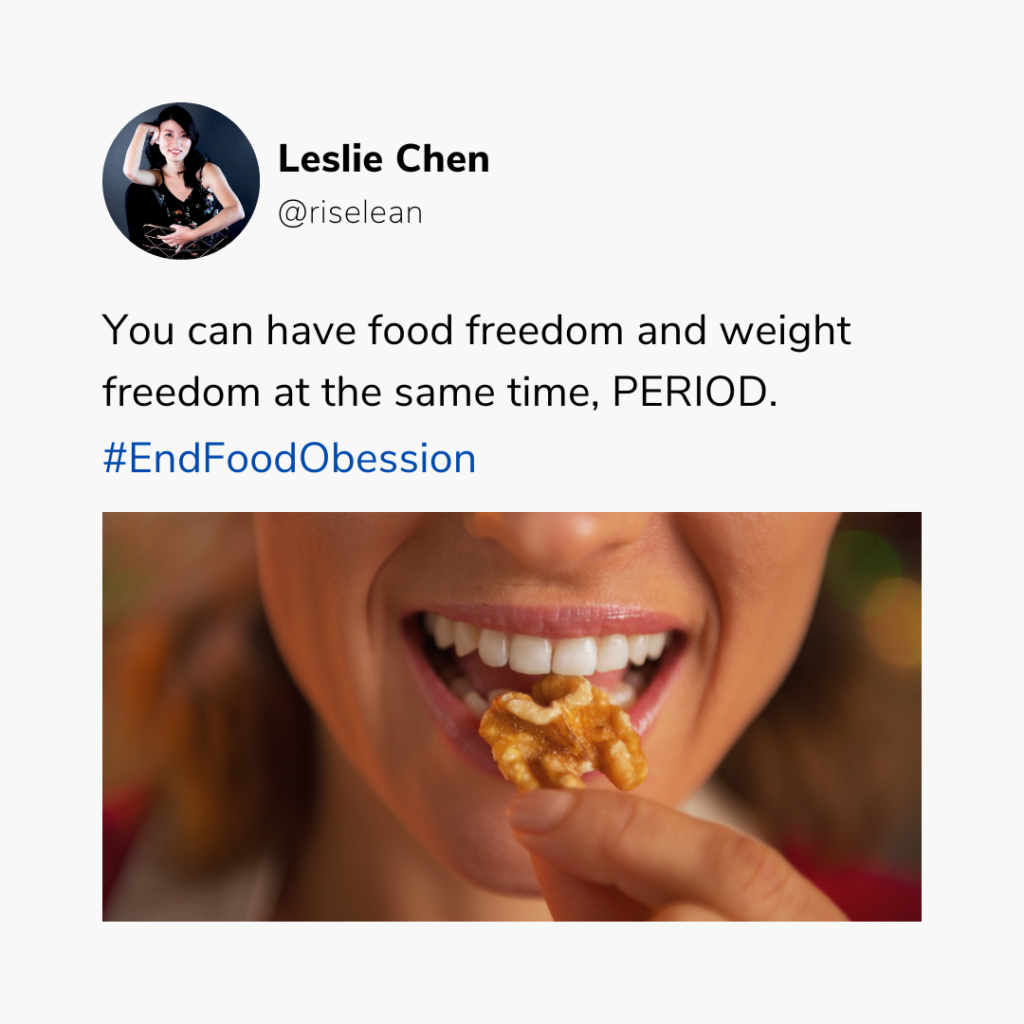Learning intuitive eating isn’t easy for someone who has been dieting for many years. There are several questions around this concept that need to be answered for her to feel comfortable about implementing it — for instance: can I really lose weight when eating intuitively? How do I eat intuitively without overeating? And what are some key intuitive eating principles that I need to follow?
In this article, I’m going to address these questions with the best knowledge I’ve gained within the past 8 years when turning frustrated dieters into happy intuitive eaters.
First of all, a quick introduction:
I’m Leslie Chen — a weight loss coach with a successful track record in helping people become skinny fit left and right while gaining unlimited food freedom. I do this through helping them rewrite their psychological, physical, and neurological patterns regarding eating and losing weight using time-tested wisdom from Asia. And this year, I’ve been selected as one of the top weight loss coaches in 2022 by Coach Foundation because of the consistent results I’ve been able to bring to my clients.
Also, you need to know that just 16 years ago, I was exactly where you are — confused, frustrated, and angry because I’ve tried all diets to lose weight, yet all I’ve gained was extra weight plus food obsession. You can read my weight loss journey here to learn how I got rid of both 50 pounds and food obsession while eating intuitively.
And keep in mind what the intuitive eating principles that you’ll learn here are going to be down-to-earth and practical because all of the were derived from real-life experiences.
What is intuitive eating?
Intuitive eating is eating the right amount and type of food while being unconsciously conscious about the eating process. There’s no over-analysis about what to eat vs. what not to eat based on certain diet rules. And eating, in this way, is rather a relaxing and care-free experience.
What are the basics of intuitive eating?
Emotionally, you are relaxed and confident when eating. Physically, your core senses allow you to eat the right type and amount of food without counting calories or weighing macros. Psychologically, you view food as fuel and nutrients instead of enemies and threats to weight gain.
To experience food differently, you have to view it differently.
Can you lose weight by intuitive eating?
The answer is absolutely YES.
In fact, intuitive eating is a must for anyone who wants to lose weight sustainably. And this is because if you don’t know how to intuitively eat the right amount and type of food and stop eating whenever you are full, without counting calories, you’ll always have the tendency to overeat. And you can never really build the confidence in your relationship with food. Both of them will stop you from real weight loss, fitness, and happiness.

“But will weight loss happen very slowly with intuitive eating compared to dieting?”
No. Most dieters have worked very hard for years and even decades but are still battling against the same amount of weight if not more.
My clients, when eating intuitively, lose weight steadily week after week, month after month, without worrying about regaining the lost weight. They don’t lose weight super fast either because fast, temporary results aren’t what they aim at. To be more specific, their monthly weight loss ranges anywhere between 4-12 pounds depending on their status when embracing total food freedom and NOT counting calories. And if you can consistently lose 4 pounds a month, it’ll take you 12 months to lose 50 pounds. That isn’t slow! And most importantly, since you didn’t do any crazy diets to lose the weight, you don’t need to worry about gaining it back at all. This is why my clients can reliably sustain their weight loss results and report the same when I check in with them many months after they graduate.
And don’t forget this:
You don’t need to lose 50 pounds to look significantly skinnier, and 20 pounds of steady fat loss will make you look 4 sizes smaller already! That’s why the majority of my clients get tons of compliments from their friends, family, and coworkers in as short as 2-3 months since they start. It’s super motivating — liberating too because now they know they can have both weight loss and food freedom at the same time. And it definitely makes it easier and easier to keep getting results.

What are the 7 essential intuitive eating principles to follow?
#1. Don’t restrict yourself
In order to learn intuitive eating, you have to stop the dieter’s mentality and the habitual thinking of self-restriction. And when I say ‘restricting yourself,’ I’m referring to restricting yourself with willpower on both the type of food and and the amount of food to eat. (I’ll tell you how you’ll eat the right amount and right type later).
Why can’t you restrict yourself?
For two main reasons: one about neurological programming and the other about inner chemistry.
Most people don’t realize this: a dieter and a holistically healthy, lean, free person are two different species. This is because even if they have the same weight number, their way of living, thinking, treating, and looking at themselves — as well as everything in their life big and small related to food, their bodies, and health — are dramatically different.
The dieter has to bear lots of anxiety and stress everyday. And her weight, whenever ‘life’ happens, bounces back after months and months of dieting. By contrast, a holistically healthy, lean person can focus on things that she’s passionate about with plenty of energy that support her passion. The neurological programming towards food, eating, key senses, and the body’s inner environment and chemistry are completely different between these two people.
And since becoming an obedient dieter and becoming a genuinely healthy, lean person are two different outcomes, you can’t walk onto the pathway towards one hoping to get to the other. This is why self-restriction on food, which is the core of a dieter’s life, won’t help you learn intuitive eating, which is the trait of a different category of people.
Meanwhile, science has found out that whenever you deprive yourself of the food you really want, you are chemically commanding your brain to make you experience more cravings and obsessed with food. I address this in detail in the video below. And to most people, when your inner chemistry is working against you, you are at a war with yourself that you can never win because how we think, feel, and eat is to a large extent a product of our inner chemistry.
#2. Believe food freedom and sustainable weight loss can co-exist.
If you are losing weight in the way that you can’t afford to have any food freedom, then you aren’t having real weight loss.
I’ve already addressed the question whether you can lose weight while eating intuitively at the beginning of this post. As you can see, the answer is a resounding yes.
One thing I do want to highlight here is that believing you can have both outcomes is the only way to be able to embrace and trust the idea of intuitive eating — AND implementing it.
And if you always believe food is your enemy, you can never have a peaceful relationship with it. That’s the bottomline.

#3. Think of food differently and give credit to food for its value.
I just said thinking of food as your enemy and fearing it will forever prevent you from having a peaceful relationship with it. And that leads to this principle: you have to think about food in a different way!
It reminds me of this:
When I first moved to the US from China (I grew up in China and came to the US at the age of 19), my jaw dropped when I first heard of the idea that carbs were evil and they made you fat.
I mean…in China and virtually all other East Asian countries, carbs meant LIFE. We had them multiple times a day, every day. And we had tens of different versions of them — noodles, vermicelli, steamed buns, dumplings, rice, spring rolls, etc. We ate carbs in large quantities, never counted their calories or grams, but ended up not having weight problems at all.
Following the American way of thinking about food, I wasn’t able to lose weight at all but gained a bunch of more weight. It was when I started re-adopting my old way of looking at food when the weight started really coming off. And it’s been 16 years so far and I haven’t gained it back.

So what’s the distinction between the American way of thinking of food and the Asian way of looking at it?
Americans think of food as calories, sugar, carbs…and trimming food intake means losing weight.
Asians consider food as nutrients and eating more whole, fresh food meaning gaining strength and vitality. Certain foods help with eye health. Certain foods help with bone health. Certain foods health with brain health. Food is a blessing, and it’s about choices and power.
If you can start valuing food for its real nature and value, you’ll stop fearing it right away. In my coaching, I teach people how to use food to re-activate their metabolism and mute their excessive cravings. That’s a great way of utilizing food! My clients eat food — plenty of them! And they eat — so that their body will has the nourishment and power it needs to lose the weight FOR THEM. That’s how they get to lose weight easily — by doing less than 10% of what they used to do when they dieted.
And understanding the words below is the key:
Losing weight isn’t your job, it’s your body’s job because it’s supposed to self-manage. Your ability to lose weight depends on how much your body is activated and fueled to do it for you. Food, however you think of it, is the fuel.
#4. Re-activate the sense of fullness.
Many people I’ve coached couldn’t feel satisfied or full before we worked together. These are the people who tend to overeat a lot.
Meanwhile, I also see the opposite case a lot, which is people who can’t feel hungry. And these are the people who tend to under-eat. Under-eating creates bigger barriers when it comes to losing weight because this is usually the case where your metabolism is slowed down. And that means your body is really set to not burn calories efficiently and resist weight loss. I talk about this extensively in How To Lose Weight Without Dieting.
Both situations indicate that you’ve somehow distorted or deactivated your sense of fullness.
The purpose of the sense of fullness is to help you automatically stop eating when you are full, without deliberate thinking involved.
That’s how you can eat satisfyingly and avoid overeating and undereating without counting calories.
And the sense of fullness, without being restored, will always prevent you from trusting yourself and building confidence in front of food.
To learn a system that helps you restore the sense of fullness, visit Lean Instinct Formula: Best Weight Loss Program For Women, which includes intuitive eating as a core component.

#5. Stop counting calories.
The counting mentality, which is at the core of the dieter’s mentality discussed above, contradicts intuitive eating in every way.
Counting calories grows your reliance on numbers, not your trust in yourself. By making you count and analyze food all the time, it takes away the freedom and confidence that you desire.
A great analogy I always use is: if you always believe you can’t walk without a crutch, and you hold onto the crutch everyday, you’ll never be able to walk independently.
Calorie counting is the crutch. It stops you from eating intuitively and freely.
Also, most people don’t realize that the CICO diet theory which millions of people live on and swear by isn’t scientific at all. It’s actually the biggest lie in the American FAD history, and I address it in detail in this video below:
#6. Use the ‘P-I-S-I-E Technique.’
I love teaching students the ‘PISIE technique’ because it always works — no matter if they want to practice intuitive eating at home or outside. And it can help them successfully navigate the trickiest occasions such as the holiday dinners and birthday parties with ease.
P-I-S-I-E stands for 5 practical guidelines to follow:
- P stands for purpose: whenever you are, focus on the purpose of you being there, not food. If you are at a friend reunion, be present for the people there and focus on the conversations and the fun of it. This stops you from getting anxious about food and over-analyzing it.
- I (the first) stands for ‘I can tell.’ When making orders, make sure you order food with ingredients you can immediately tell at the first glance. Something mushy with mixed ingredients usually hides lots of extra fat, sugar, and oil in it. For example: steak is good, sausage is questionable. When ordering something and looking at the pictures of the entrees on the menu, ask yourself “can I tell?”
- S stands for satisfaction. Satisfy yourself, for the reason shared in Principle #1.
- I (the second) stands for Inflammation, meaning avoiding food that causes chronic inflammation. There are a ton of reasons why you should avoid it. In my post about removing apron belly, I’ve clearly explained how chronic inflammation causes excessive belly fat which is a far bigger issue than just ‘extra fat.’ In the same article, I’ve also discussed why chronic inflammation is a challenging barrier for weight loss and how it keeps you overeating and falling for your cravings by messing with your hormones. I’ll stop at the main gists here. For more about chronic inflammation’s impact on your weight loss and health, and a list of anti-inflammatory foods, read this article.
- E stands for enjoyment. Enjoy the food, the people, the environment, the conversation you are having over food, the music, and the vibe. Just have a good time.

#7. Don’t weigh yourself too frequently.
Weight loss isn’t linear. Weighing yourself everyday could be a sign of obsession towards weight, and this obsession prevents you from treating food with ease.
Imagine yourself not able to eat or think normally about food every time after you weigh yourself. Regardless if you’ve gained weight or lost weight, you’ll always remind yourself that your biggest priority is weight loss. That, again, unleashes the dieter’s mentality. It means your life revolves around food and weight. It keeps you obsessed with the two, therefore missing out on whole lot of fun in life!
And as we’ve talked about earlier, you can’t live the lifestyle of a dieter hoping to be a holistically free, healthy, and lean person because these two are different types of people.
In my article The Worst Time To Weigh Yourself, you can find very useful guidelines on how to weigh yourself without sabotaging your progress to be healthy. And one takeaway I do want you to gain from it is this:
One big step for changing your relationship with your body is changing your relationship with the scale.

Final Words:
Frankly speaking, intuitive eating is an instinct. You can tell that by seeing your two year old eating just the right amount of food then stop. He doesn’t count grams or calories, nor does it analyze macros. He eats freely and grows with the right balance.
What made you lose that instinct? Diets, and the dieter’s mentality.
By chronically ignoring and suppressing how your body truly feels (the innate signals), you’ve suppressed the key instinct and senses behind intuitive eating. That’s how you lost it.
Leslie Chen is rated as Top Weight Loss Coach In 2022 by Coach Foundation. For 8 years, her Lean Instinct Formula™ has helped people lose weight left and right while gaining unlimited food freedom.
If you are READY to start losing weight consistently and sustainably without dieting — while eliminating 90% useless work you are doing now, check out the idea of working with a high-performance weight loss coach and book a clarity call with us.
You May Want To Read The Following:
My Weight Loss Journey of Losing 50 Pounds Without Trying
A Simple Mindful Eating Exercise To Stop Overeating
Is Having Unlimited Food Freedom While Losing Weight Too Good To Be True?
How To Recover From A Cheat Day
Losing Inches But Not Weight? Congrats!


